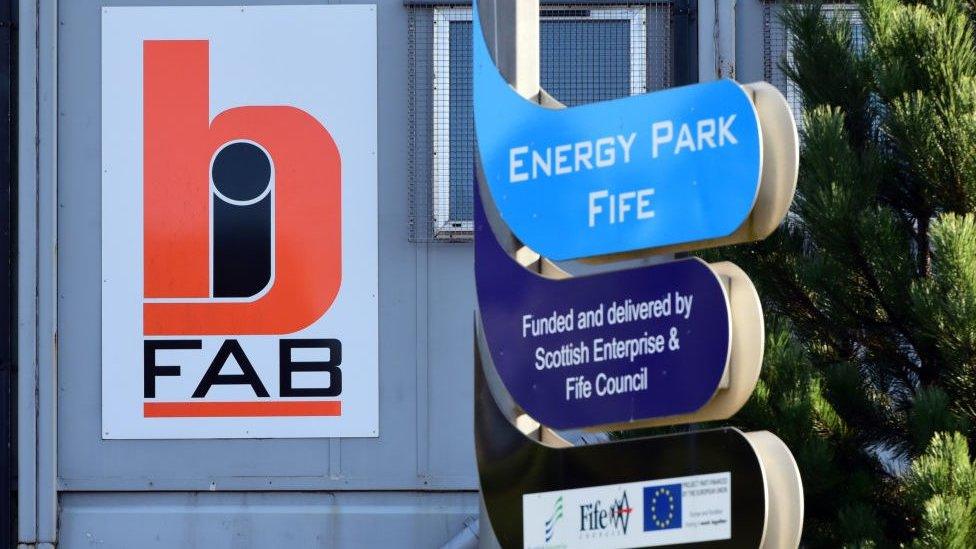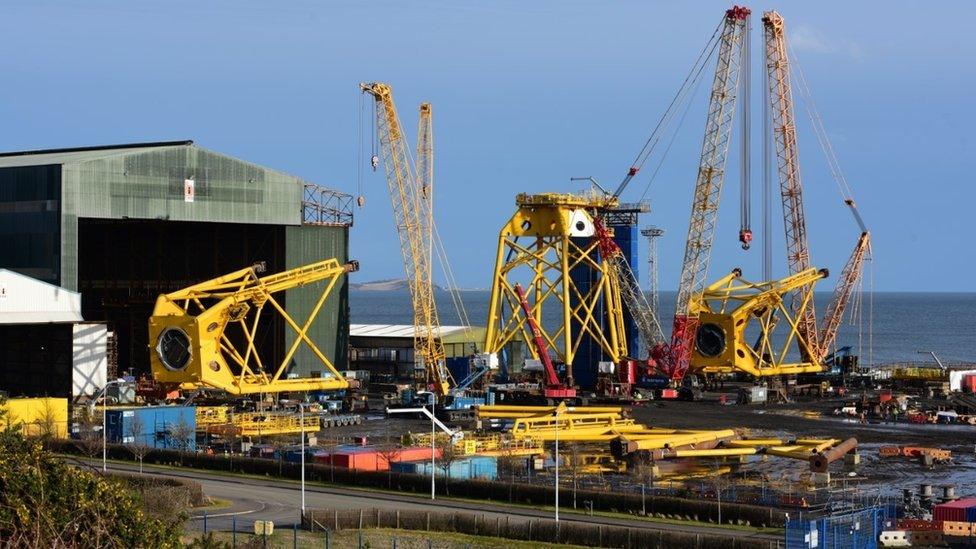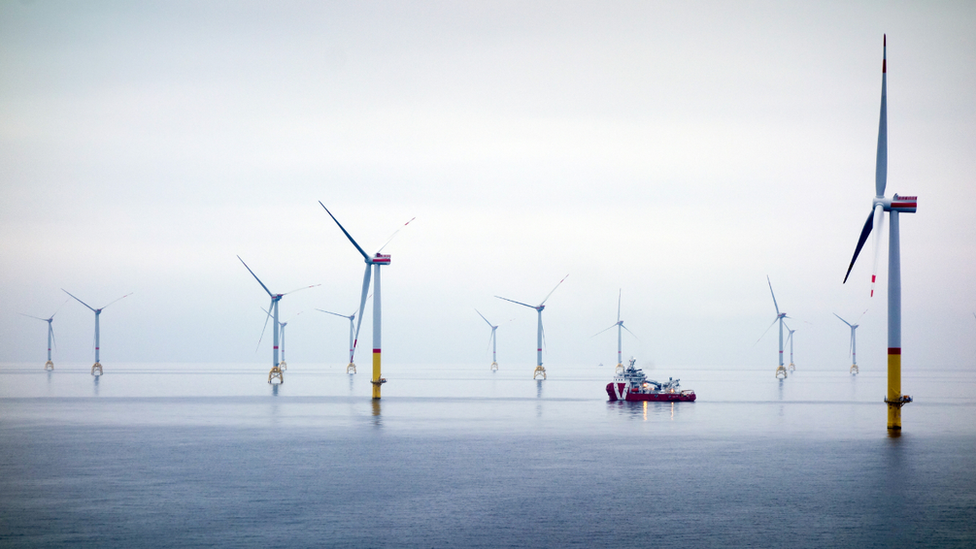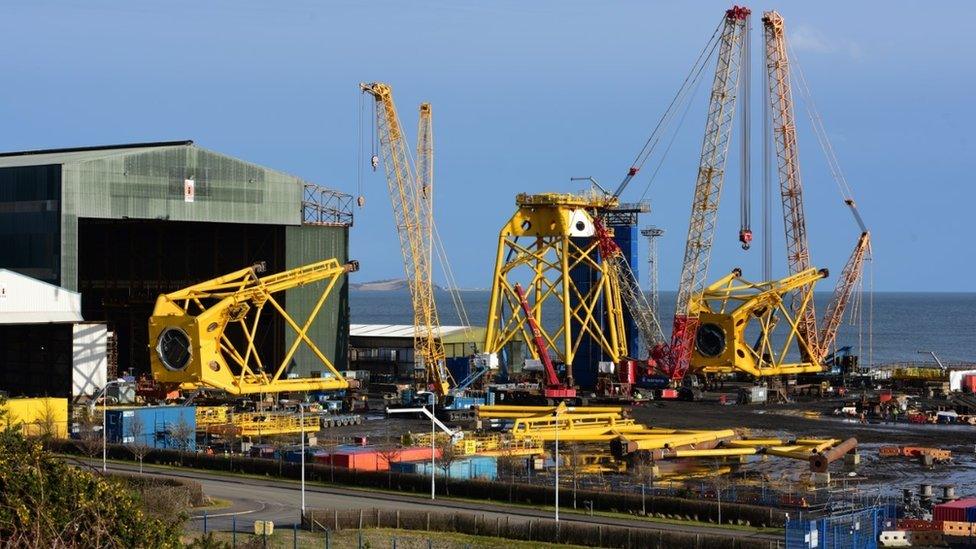Scottish government 'cannot continue to support' BiFab
- Published

The BiFab yard in Methil is one of two mothballed fabrication yards in Fife
The Scottish government cannot continue to provide financial support to troubled engineering firm BiFab due to legal constraints, MSPs have been told.
The government has pumped more than £50m into the company, which has two yards in Fife and one near Stornoway.
But Economy Secretary Fiona Hyslop told MSPs the firm was in a weakened state and that state aid rules prevented any more public money being spent on it.
Unions said this was an effort to "deflect" and not take accountability.
And opposition parties said ministers had "let down the workers" of BiFab.
The Scottish government took a stake in the BiFab yards when they were saved from permanent closure in April 2018.
However, it recently withdrew a £30m guarantee from the company's bid for work manufacturing parts for offshore wind farms, citing state subsidy rules - which effectively ended hopes of creating 450 jobs.
Ms Hyslop said BiFab had been hit hard by the Covid-19 pandemic and a "greatly weakened cash flow and balance sheet" - and criticised Canadian owners DF Barnes for not investing more.
She told MSPs that "the Scottish government cannot currently legally continue to financially provide more support to BiFab".

She said: "My conclusion is based on a range of facts including the current position of the business, its trading forecasts, its prospects for future work and the continued 'no risk' position of the majority shareholder.
"For financial support to be legal, it needs to be in line with the market economy investment principle.
"We can only act as a commercial investor would.
"If the majority shareholder is not prepared to invest in the business, then it is hard to demonstrate that another commercial investor would."
'Attempt to deflect'
Responding, the joint trade union group representing BiFab staff called on the government to release its legal advice.
It said: "Today's statement amounts to little more than an attempt to deflect from the Scottish government's role in BiFab's predicament, rather than providing accountability and a way forward for the workers' and communities dependent on these yards."
The Scottish Greens also accused ministers of "hiding behind state aid rules", with MSP Mark Ruskell saying: "There are plenty of examples across Europe of countries protecting their own supply chain through smart investments, so ministers cannot continue to hide behind state aid rules."
And Lib Dem leader Willie Rennie said Ms Hyslop's statement was "nothing more than a long list of excuses which will provide no comfort to the BiFab workers who were promised so much".

Former prime minister Gordon Brown, who has campaigned to keep the yards open, said: "We have won round one and managed to stop the SNP government from pushing BiFab into administration. The yard now lives on to fight another day."
"I welcome the UK-Scottish government working party. We will not relax, but step up our efforts, to save the 400 to 500 jobs in BiFab and to keep Scotland's future in the renewables industry alive.
"I will now be submitting a dossier to both the UK and Scottish governments showing that, in contradiction to what has been said by the SNP economy minister, there are plenty of avenues that have yet to be investigated and explored in order to retain work at the yard."


To listen to Fiona Hyslop, there's a huge rift between the two shareholders of BiFab - DF Barnes of Newfoundland, and the Scottish government, which owns a third of it.
The Canadians were brought into BiFab by the Scottish government in 2018. They say their job was to do the marine engineering and project management while St Andrew's House would provide the finance.
That was the basis for the £30m contract guarantee, first offered and recently withdrawn, citing state aid rules. The same state aid rules existed when the guarantee was first offered, and they could be washed away in less than two months, with the end of Brexit transition.
I'm told the Canadians are "puzzled" and "bewildered" that they're being portrayed as taking no financial risk on BiFab. That wasn't their understanding of their role.
The three yards, badly in need of investment, are owned by Forth Ports, Scottish Enterprise and Highlands and Islands Enterprise, so there is not much risk of profiteering by stripping out the assets. They said last year they don't foresee any profit for at least five years.
And they were astonished, in September, to be told by the Scottish government that ministers might push BiFab into administration. That appears to have been an idea floated and then rejected, for failing to solve the state aid impasse.
The astonishing bit was that it would have cost the Scottish government - already in deep, with £52m in loans and equity investments - a lot more than DF Barnes.
What happens next? On that, it's not just the Canadians who are bewildered and puzzled.

The BiFab yards were seen as a way for Scotland to find manufacturing benefits from billions of pounds being invested in windfarms on and offshore.
The current round of offshore wind farms, which secured a minimum price from government-run auctions, are now in the construction phase.
DF Barnes had been negotiating to build jackets for wind turbines to be installed off Fife by French firm EDF.
But in October the company pulled out, citing a refusal by the Scottish government to provide financial guarantees.
All three fabrication yards - at Burntisland, Methil and Arnish - are currently mothballed.
Prof Jim Skea, chairman of the Just Transition Commission - which was appointed by ministers - has written to the government saying that without "concrete action and investment, (they) risk repeating the current situation, with jobs and economic prosperity lost abroad".
He warned that public support for the transition to a greener economy would require Scottish economic benefits linked to subsidies on wind farms.
- Published2 November 2020
- Published21 October 2020
